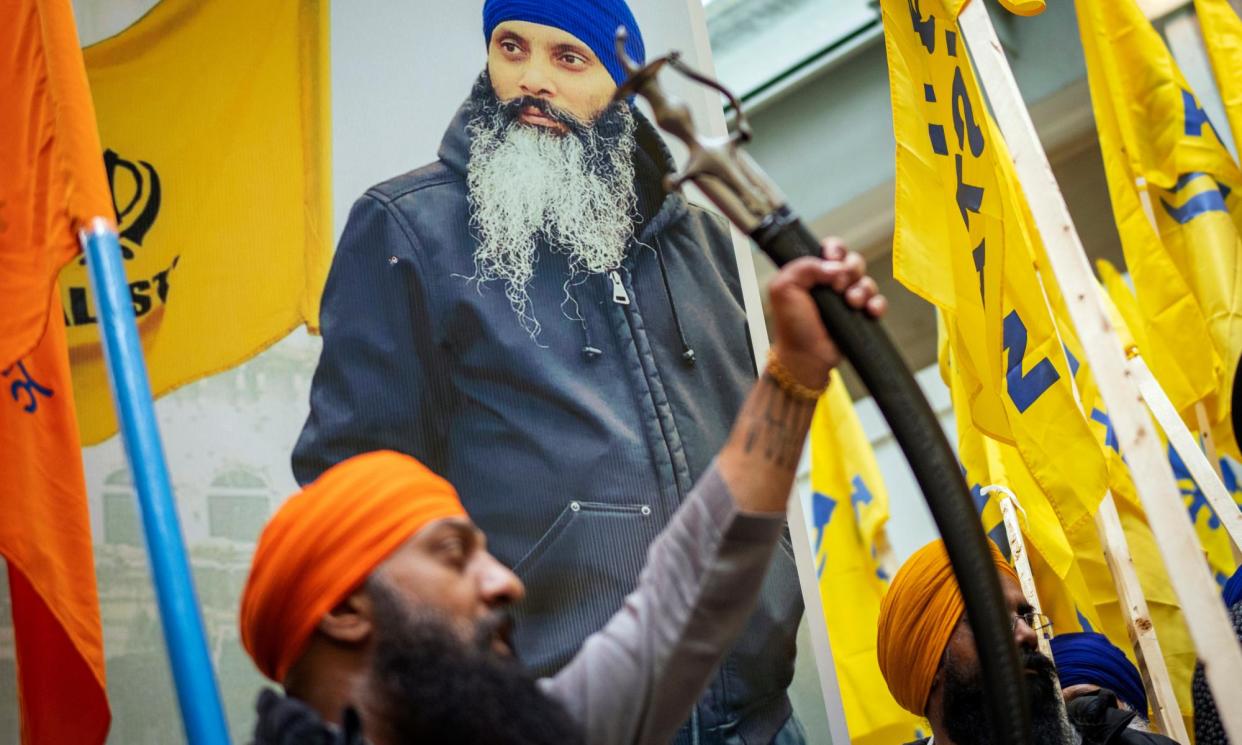Canadian police charge three over killing of Sikh activist

Canadian police have charged three members of an alleged hit team for their role in the assassination of the Sikh activist Hardeep Singh Nijjar, the first arrests in a high-profile killing that officials believe was masterminded by India.
The arrests come nearly a year after the prominent activist was killed in the parking lot of the Guru Nanak Sikh gurdwara on the evening of 18 June in the city of Surrey, British Columbia. In what investigators previously described as a carefully orchestrated operation, two assailants fired about 50 bullets at Nijjar and escaped the area in a grey car.
According to court documents, Karanpreet Singh, 28, Kamalpreet Singh, 22, and Karan Brar, 22, have been charged with first-degree murder and one count of conspiracy to commit murder in Nijjar’s death. The three men arrested on Friday were living in the city of Edmonton, Alberta, and will be transported on Monday to British Columbia to face charges. The indictments allege the conspiracy was planned in both Surrey and Edmonton between 1 May and 18 June.
Brian Edwards, Royal Canadian Mounted Police (RCMP) assistant commissioner, called the killing “outrageous” and “reprehensible”, adding that the investigators worked closely with members of the Sikh community.
“It had a profound impact on the residents of Surrey and, notwithstanding today the announcing of charges, those scars will remain in our community for a long time,” he said.
In September, the prime minister, Justin Trudeau, told parliament his government had “credible allegations” that India was behind the killing, calling the death of a Canadian citizen on Canadian soil an “unacceptable violation of our sovereignty”.
India has denied direct involvement in the killing of Nijjar and suggested “rogue” operatives were behind a separate attempted assassination of a prominent Sikh figure in the United States.
The fallout from Nijjar’s murder has chilled relations between Canada and India – and exposed what officials say is a transnational campaign of violence by India, meant to target dissidents abroad.
On Friday, the Indian high commissioner, Sanjay Kumar Verma, declined to comment on the arrests, calling them an “internal” matter for Canada.
Canada’s public safety minister said the arrests confirmed “that the RCMP take these matters extremely seriously”.
“While today’s action by Canadian authorities, which led to the arrest of those directly involved in the killing, is a step forward, it only scratches the surface,” Gurpatwant Pannun, himself the target of a failed assassination attempt, said in a statement.
He also called on Canadian police to pursue the intelligence agents and diplomats allegedly involved in the killing in order to “dismantle the networks that enable and perpetuate such crimes against Canadians on Canadian soil”.
The men arrested on Friday are Indian citizens who entered Canada on student visas three to five years ago. None has permanent residency, said Supt Mandeep Mooker. More arrests in connection with the murder are possible, he said, adding that police were working with other units in “active investigations” across the country.
Six men and two vehicles were involved in Nijjar’s murder, according to previous statements from police.
“We remain dedicated to finding and arresting each one of these individuals,” said Mooker.
The CBC reported police were investigating three other murders in Canada, including the “sick and twisted” killing of an 11-year-old boy in the city of Edmonton.
The World Sikh Organization said in a statement the charges raised “disturbing questions about the nexus between the government of India and criminal gangs”.
Assistant commissioner David Teboul, commander of the Federal Policing Program in the Pacific region, told reporters that the shooting of Nijjar was “very much under active investigation … and these efforts include investigating connections to the government of India”. He said it had been “challenging and difficult” working with Indian officials in Canada and counterpart agencies in India.

